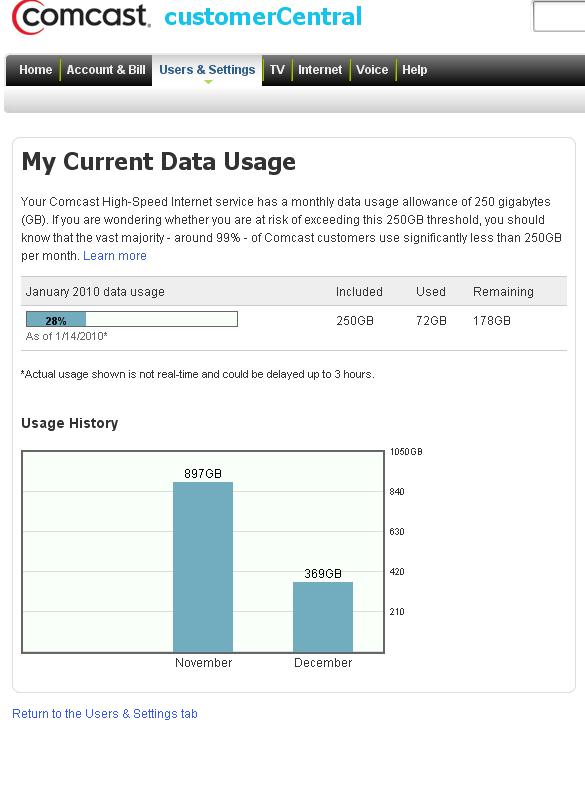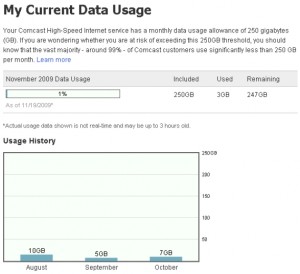![]() Broadband Reports noticed Comcast’s usage meter has broken out of its limited trial in Portland, Oregon and customers are receiving notices across the Pacific Northwest noting the company’s usage meter is now available for their ‘convenience.’ But remarkably, Comcast has told 99 percent of their customers they “do not need to check the usage meter” because they won’t be close to the company’s 250GB limit:
Broadband Reports noticed Comcast’s usage meter has broken out of its limited trial in Portland, Oregon and customers are receiving notices across the Pacific Northwest noting the company’s usage meter is now available for their ‘convenience.’ But remarkably, Comcast has told 99 percent of their customers they “do not need to check the usage meter” because they won’t be close to the company’s 250GB limit:
We are pleased to announce the pilot launch of the Comcast Usage Meter in your area. This new feature is available to Comcast High-Speed Internet customers and provides an easy way to check total monthly household high-speed Internet data usage at any time. Monthly data usage is the amount of data, such as images, movies, photos, videos, and other files that customers send, receive, download or upload each month.
Comcast measures total data usage and does not monitor specific customer activities to determine data usage. The current data usage allowance for the Comcast High-Speed Internet service is 250GB per month. This means that the vast majority of our customers – around 99% currently – will not come close to using 250GB of data in a month, and do not need to check the usage meter.
That leads to two questions: Why would a company make an effort to produce a meter that is irrelevant to the vast majority of customers, and why institute a usage cap at all if only one percent of customers come close to exceeding it?
The answer, of course, is that most customers won’t need to worry about the limit today, but tomorrow is another matter.
As more broadband users begin watching video over Comcast’s broadband service, they will come perilously closer to the fixed limit Comcast offers — a limit that protects Comcast’s cable television package from customers switching to broadband-based viewing.

Bandwidth Hog? One customer consumed 897GB last November... using a backup method Comcast itself recommends to customers
Once Internet Overcharging schemes get their foot in your door, it’s usually only a matter of time before they force their way in and start looking for your checkbook.
Would Comcast seek to eventually lower today’s 250GB limit? Perhaps, but there is no evidence of anything imminent. It has been done before in Canada and sold as a “money-saver,” offered with an “insurance policy” Bell had the chutzpah to suggest “protected” customers from overlimit fees. Monetizing broadband use is a hot topic for providers seeking enhanced revenue from their broadband divisions. Time Warner Cable tried to convince customers it would tie revenue earned from its own Internet Overcharging experiment into expansion of their local broadband networks. That was proven blatantly false when upgrades commenced in areas never part of “the experiment,” while those that were have been bypassed for DOCSIS 3 upgrades.
Some might believe such limits protect providers from dreaded hordes of malicious “bandwidth abusers,” a broadband urban legend comparable to the Cadillac-driving welfare queens we heard about in the 1980s. In truth, the handful of so-called “abusers” have quietly been dealt with under the terms of existing Acceptable Use Policies for years without inconveniencing the vast majority of customers with arbitrary usage limits. But the industry-sponsored narrative persists, usually in the form of some neighborhood hacking teenager sucking your bandwidth dry and costing you money.
What constitutes “excessive” or “fair” use ludicrously ranges from Frontier’s infamous 5GB usage allowance to Comcast’s 250GB limit. Every company insists their limit is the fairest and that 99 percent of customers won’t exceed it, no matter what it is.
Are there consumers moving a lot of data across Comcast’s network? Yes. One Broadband Reports reader in Spokane posted a usage report showing a whopping 897GB of consumption in November. Was he running a torrent client swapping an illicit copy of Avatar with people all over the world? Was he downloading lots of illegally obtained music and movies? Was he running a commercial business on a residential connection? No. It turns out he was retrieving a backup to restore data from a failed hard drive. In fact, Comcast recommends customers use online backup services, and even provides customers with a free, limited version of Mozy, which includes an easy path to upgrade to much larger storage plans.
Even Comcast doesn’t believe in the usage-limits-solve-congestion meme. In response to a query from IP Democracy back in February, 2008:
“Most [ISPs] recognize that a metered approach doesn’t solve peak-hour usage pressures.”
But it will do wonders for a provider’s bottom line.


 Subscribe
Subscribe
